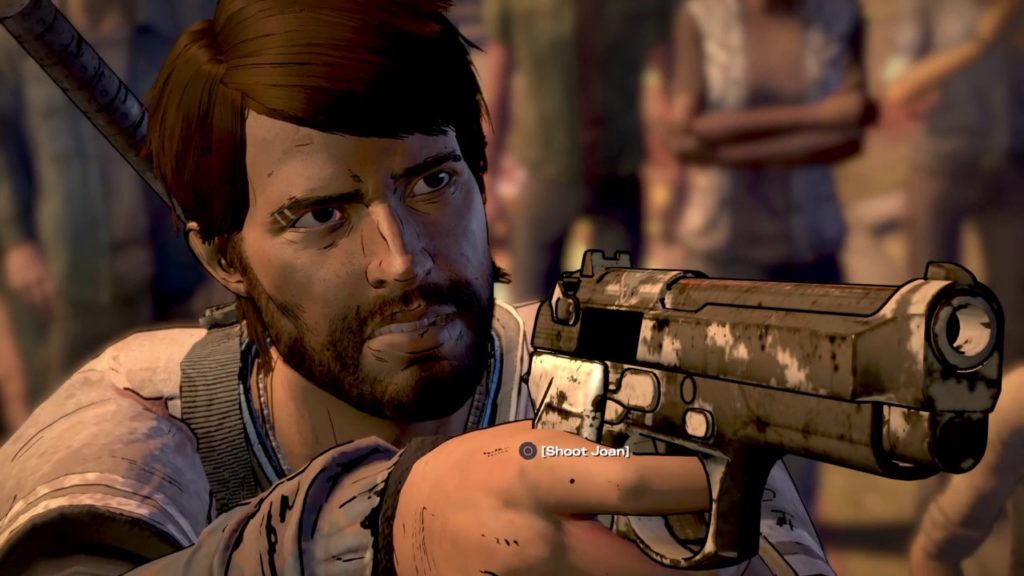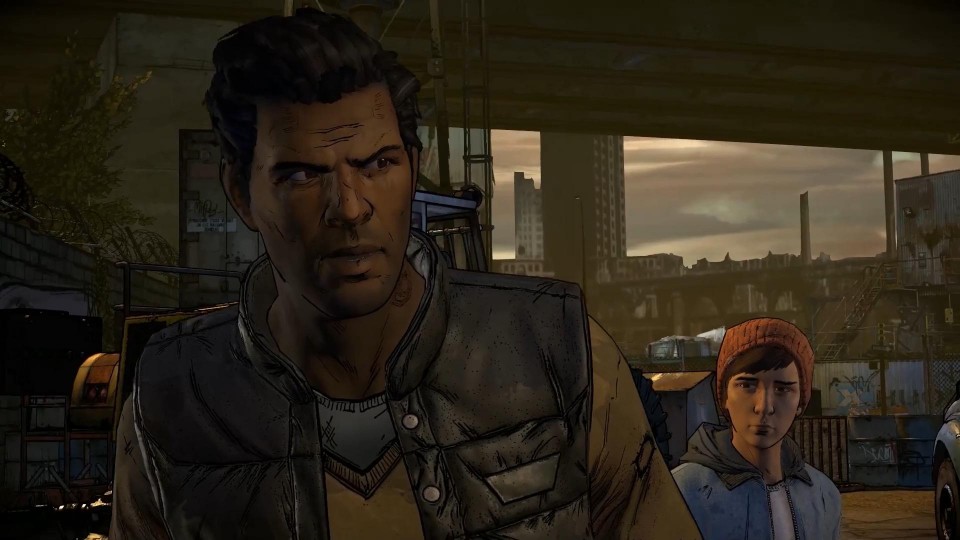“I’m looking forward to seeing what the rest of the season has in store, particularly as far as the relationship between Clem and Javi is concerned. The first two episodes sow some interesting seeds as far as the plot goes, and I’m invested enough that I’m looking forward to seeing where things go. At the same time, I don’t wonder if The Walking Dead is something that needs to stay buried – not because it’s bad, but because it’s run its course.”
Those were the concluding remarks of my of the double-episode debut of The Walking Dead: A New Frontier. Here was a game that felt a little bit too familiar, yet with a self-awareness that hinted at a clever parody of the whole played-out genre of zombie apocalypse fiction.
With the release of Episode 5: From the Gallows bringing the series to a close, and the blessing of hindsight, I can safely answer my own rhetorical question: The Walking Dead is a series that should be left to rest in peace, having well and truly run its course.
Any hope of A New Frontier is an introspective critique of its own foundations quickly gave way in Episode 3, a meandering series of zombie cliches and by-the-numbers character drama with none of the emotional depth that makes those things tick. Episode 4 had exactly the same problems, to the point that I didn’t even review it because I couldn’t see any way to do so without simply copy-pasting my Episode 3 review. The finale does make an effort to salvage that, but it’s too little too late: a string of dramatic plot beats that would be heart-rending if only the game had made any effort to make its audience care about the characters, and if only we hadn’t already seen these plot beats a dozen times before.

Over the course of its five episodes, A New Frontier gives us:
- A community of survivors led by a Machiavellian dictator
- A “Sophie’s Choice” where you have to choose whose life to save
- A character making a noble sacrifice to save the group as a last act of redemption
- An innocent and beloved character getting killed off “unexpectedly”
- An argument about whether someone is or isn’t infected
- A scene where someone has to “put down” a loved one before they turn
- Questionable first aid was given the lack of resources
- Cover yourself in zombie’s guts so that you can walk through the herd unaccosted
Now, these are all things that can work wonderfully when used sparingly and with care; The Walking Dead: Season One and The Walking Dead: Michonne are both proofs of that. A New Frontier is neither sparing nor careful, though, so it turns into a medley of zombie cliches hamfistedly strung together.
To its credit, A New Frontier does at least try to add a few more original ideas, and these come to their conclusions in From the Gallows. The episode’s main thread is a conflict between estranged biological brothers, which is unusual in a genre that almost always builds its stories around strangers brought together by circumstance. There’s an interesting subplot to do with the struggles of stepmotherhood and another that questions the necessity of violence even in a zombie apocalypse.
Had they been given the time and space to develop, these ideas could have made A New Frontier into another Telltale masterpiece. Instead, the game spends the bulk of its running time hopping aimlessly between tired plot beats and uninteresting side characters.

Why should I care about Javi’s relationship with his brother, David, when the only characterization I’ve got for either of them, across four and a half episodes, is that David’s an asshole and Javi’s as bland as a blank piece of paper? Why should I care about Gabe’s aversion to violence when it’s constantly sidelined by scenes that revel in exactly that violence? Why should I care about Kate’s maternal struggles when players never get much chance to actually explore them with her?
That’s my biggest problem with A New Frontier – not the repetitiveness or the over-reliance on well-worn plot devices, but the fact that these things drown out the moments where the game genuinely tries to push boundaries the way Season One did.
You might have noticed that I haven’t mentioned Clementine, the poster girl of Telltale’s arm of The Walking Dead franchise. That’s because, in A New Frontier, she’s reduced to a bit part as a side character. I’ve said before that I can understand and even respect Telltale’s desire to move away from Clem and tell a different story about different characters in that same universe. But that approach only works if the characters taking the lead in her stead are just as interesting and emotionally resonant – as was the case with Michonne. A New Frontier has no such alternative, and Clem’s continued presence as a side character only draws attention to the newcomers’ shortcomings. It feels like she’s included here purely for star power and brand recognition, and that’s really poor treatment of one of the medium’s greatest characters.
And again, this is where A New Frontier shows great potential, only to squander it. Not just because Clem is interesting, but because her development as a character since the end of Season 2 seems like a fascinating one, from what little we get to see. She becomes an adoptive mother to baby AJ, despite still being so young – a point that was really driven home at one point in Episode 4 when she talks about getting her first period. Being a teen mother even in the boring old real world is a huge issue that could alone be the basis for an entire series, let alone in the midst of a zombie apocalypse, but once again, A New Frontier’s most pointed developments are reduced to window dressing. Clem deserves better.
All of that said, there’s one thing I really liked about A New Frontier’s ending, and that’s the way it deals with player choice stats. If you’ve ever played a Telltale game, you’ll be familiar with the round-up at the end of each episode showing a breakdown of what players did in key moments – who you saved when forced to make a choice, how you responded to a particular event, and so on. From the Gallows retains these, but it also gives you a summary of your version of the story based on the entire season.

There’s a summary of Javi’s relationships with David, Kate, and Gabe at the finish (mine were “Dysfunctional”, “Mixed Signals”, and “Caring”, respectively), as well as Clem’s growth across the series (my Clem became “A Liberated Warrior”). You also get brief summaries of outcomes for the minor characters, including those who lived and died. These are all interesting in their own right, and really create a sense of these characters being your own, but they also hint at how you might play differently to get different outcomes, should you so choose.
If only this innovative ending summary could have been attached to a better game. The Walking Dead: Season One was a bonafide masterpiece, and we’ve somehow gone from that to something I wish would just stay dead.